Last month, the River Exe came alive with song, night swimming, stories and a wild salmon run for the first Festival of the River Exe. Transition co-founder Rob Hopkins hears about the three Transition groups who collaborated to protect, restore and celebrate their local river, harnessing public outrage at the state of our water and transforming it into local action.
In May’s local elections in England and Wales, the Conservative Party received a drubbing, losing control of councils up and down the land. The one tipping point which seemed to unite voters in a tsunami of revulsion, was the huge rise in the amount of sewage in our rivers.
Across the country and political spectrum, there was fury that the privatised water companies were paying huge bonuses to their shareholders while their underfunded and inadequate infrastructure was filling rivers with excrement and destroying ecosystems. People rallied in support of their rivers. In my town a demonstration against our MP, who had voted against regulation of the water companies, memorably featured a dancing turd and brave souls in their swimming costumes (it was in November!).
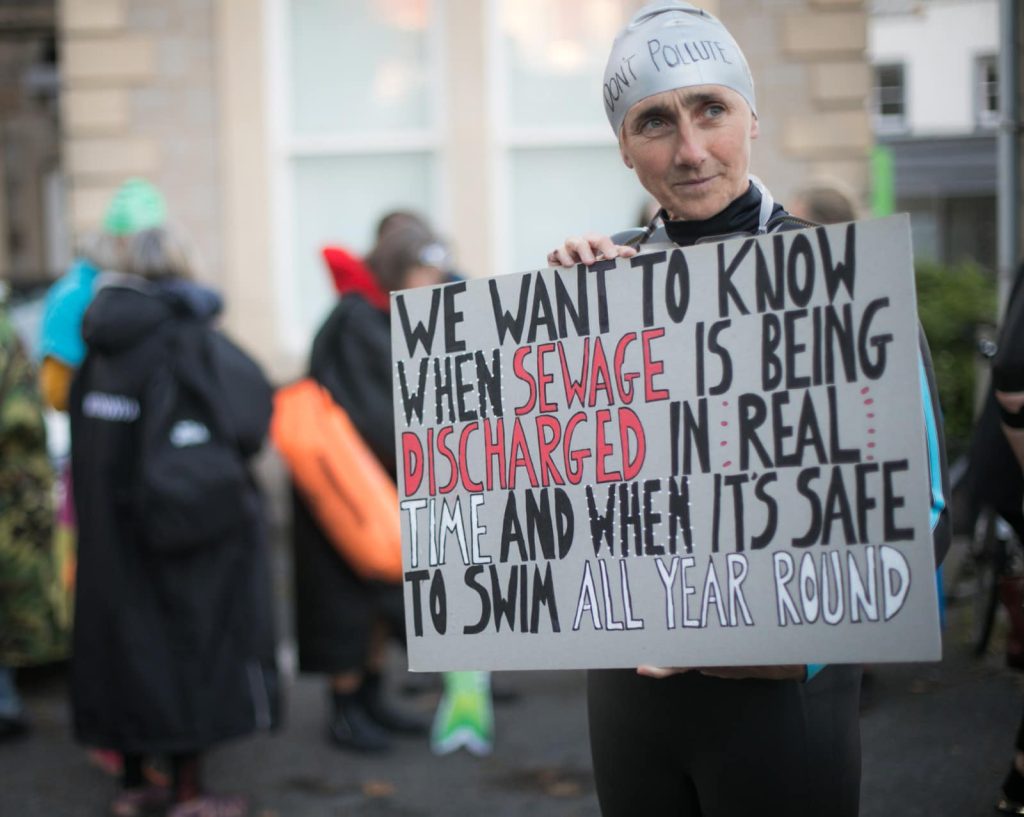
Protests at the state of our water and the discharge of sewage, like this one in Exmouth, brought together swimmers, surfers, environmentalists and more.
Communities began fighting for their rivers to gain legal rights and protection, inspired in part by the story of the City Council of Guajará-Mirim in Brazil, which passed a resolution giving the local Laje river, known to the indigenous people as Komi-Memen, the same rights as humans.
Around this time, a project called Escape (End Sewage Convoys And Poollution Exmouth), run by a group of Exmouth-based citizen scientist activists, uncovered that raw untreated sewage was being trucked into Exmouth’s sewage plant from other surrounding facilities which were not fit for purpose. Then, when it rained, the Exmouth plant couldn’t cope with the amount of sewage it was being asked to handle, and so sewage was being discharged into the estuary of the River Exe. Local people were appalled.
But it turns out that people up and down the length of the River Exe were having similar conversations. A Zoom call was convened between people from Sustainable Tiverton, Transition Exeter and Transition Exmouth to explore the possibility of coming together to create a collaborative effort to improve the river. And so Friends of the River Exe was born.
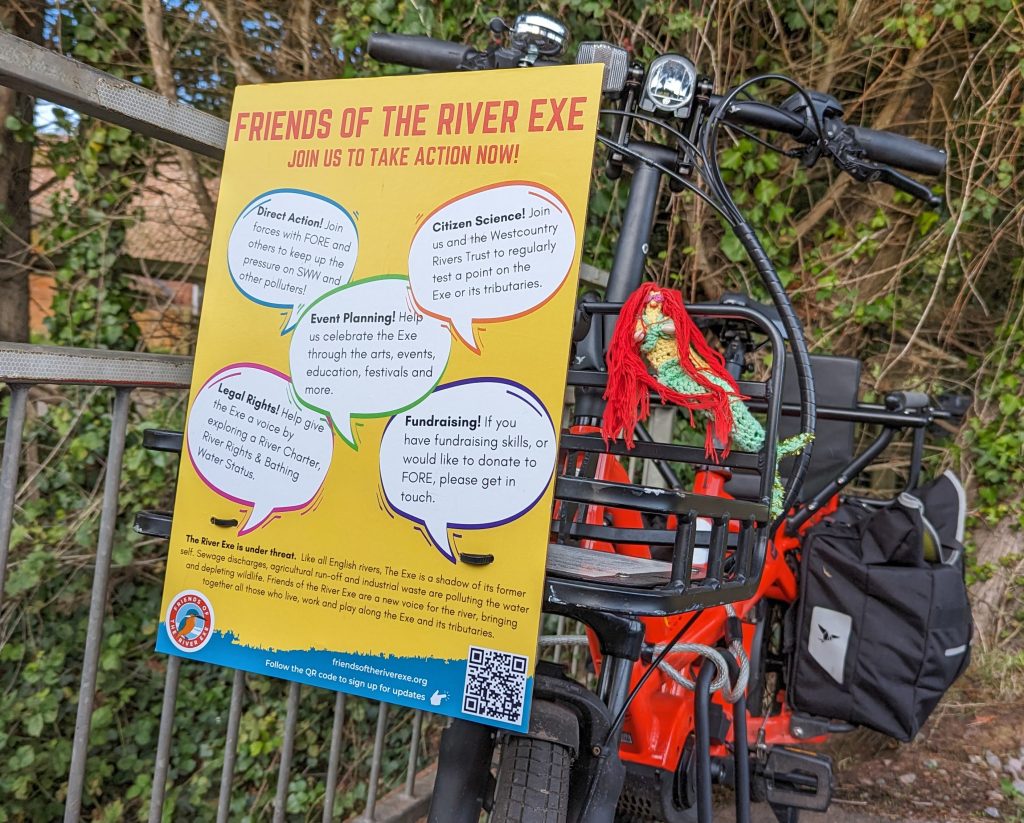
About then Transition Together launched its last round of seed funding, supported by the National Lottery Community Fund, and the Transition groups wondered if this might be their opportunity to do something. “There’s no way we’d have done this if that funding hadn’t been there”, Nicky Nicholls from Transition Exmouth told me.
They teamed up to make a joint bid to develop Friends of the River Exe, applying for a partnership grant. These larger grants were designed to help where a number of Transition groups wanted to work on a common issue, thereby having more impact. The seed funding grant allowed them to harness the outrage that many were feeling about the state of our rivers, and transform it into practical local action, while also highlighting the local impact and role of the local players.
Friends of the River Exe got to work. Nicky took on the role of managing “the boring stuff”, and together with other core group members, they took on two members of staff, Clare and Mary, and held the role of oversight over the project. The group, inspired by Friends of the Upper Wye, wrote a vision statement which ended by saying “if you agree with this, then you are a Friend of the River Exe”.
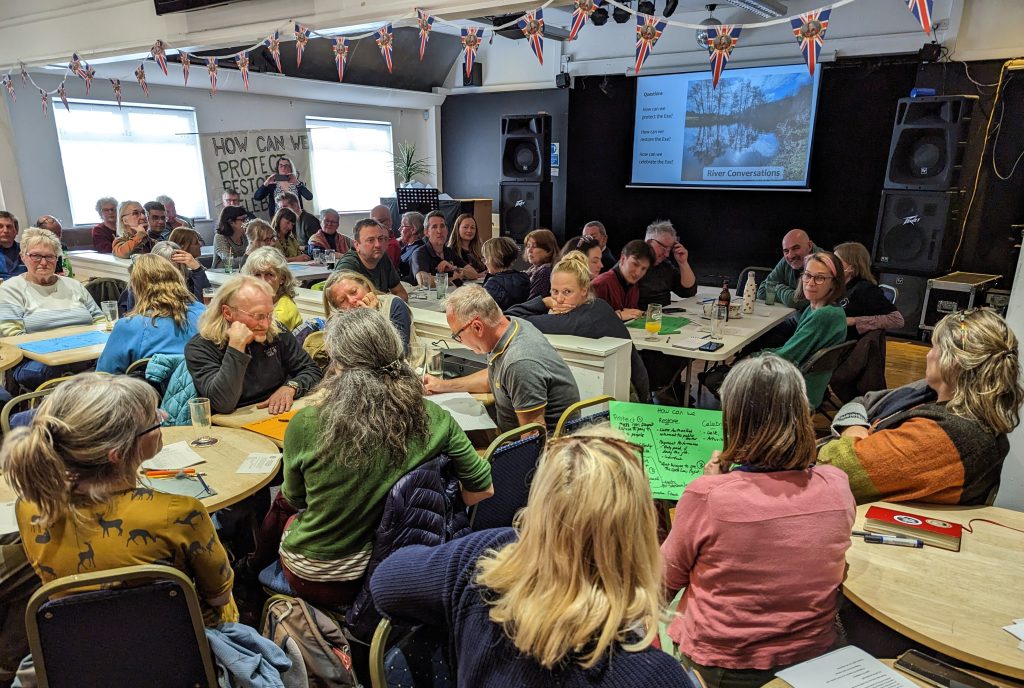
Over 200 people came out to participate in ‘River Conversations’ and share ideas and pledges to protect, restore and celebrate the River Exe.
They held 3 big ‘River Conversations’ events and were bowled over by the response, with between 70 and 100 people coming to each one. They settled on seeing the group’s role as being “a voice for the river, bringing together the diverse grassroots organisations and people who live, work and play along the Exe and its tributaries – to protect, restore and celebrate our river.”
It became clear from their public meetings that at different points along the river, different people have different relationships with it. In some stretches, it is very much the domain of the farming community, at others it is closer to anglers, or residents, or tourism groups. With different perspectives and experiences, the project has engaged canoeists, swimmers, farmers, litter pickers, climate activists and given them a way to unite around their common concern to protect and restore the river.
At the end of each of the River Conversations meetings, people were asked to complete a pledge card, setting out what they could offer to the wider campaign. From this, different working groups formed, looking at different areas like legal rights, direct action, citizen science/water quality monitoring or hands-on conservation projects, fundraising, and Festival Planning. “All sorts of amazing people came out of the woodwork”, Nicky told me, “the question was how to make best use of them all!”
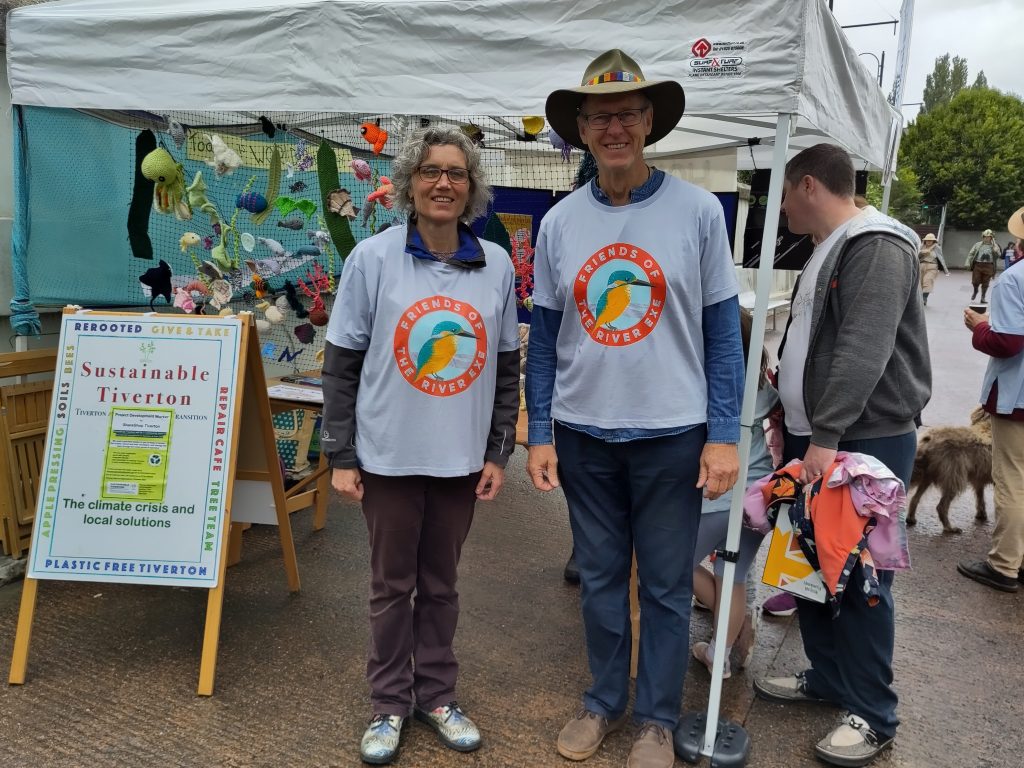
Volunteers from Sustainable Tiverton staff a stall in their village during the Festival of the River Exe.
The group is aware of its limitations, and where possible it collaborates with other organisations, including Westcountry Rivers Trust, Devon Wildlife Trust, the East Devon Catchment Partnership and Exe Estuary Management Partnership. For example, the West Country Rivers Trust already has an extensive citizens’ science programme, so they pass volunteers on, saying “we’ve got 75 more volunteers for you!”
Four women with a lot of knowledge around legal matters, one of whom is a lecturer at the University, are working on a River Charter to protect the river. Landowners are coming forward to see what role they can play. Sectors of society who are often at odds about the river are coming forward, such as anglers. As Nicky put it, “we are having to learn how to sit among and bring together such different groups while also amplifying their voices of concern”.
They discovered that 24 September was World Rivers Day, and so they put out a call for ideas for who wanted to be part of an event celebrating the River Exe. In the end, ‘Festival of the Exe’, 10 events, up and down the length of the river, were proposed by many different local partners, ranging from oral history events and creative writing to night swims and “a Walk That Reconnects”. The diversity showed how they’ve managed to widen the conversation about the river beyond the Transition core groups or those who normally identify as climate activists.
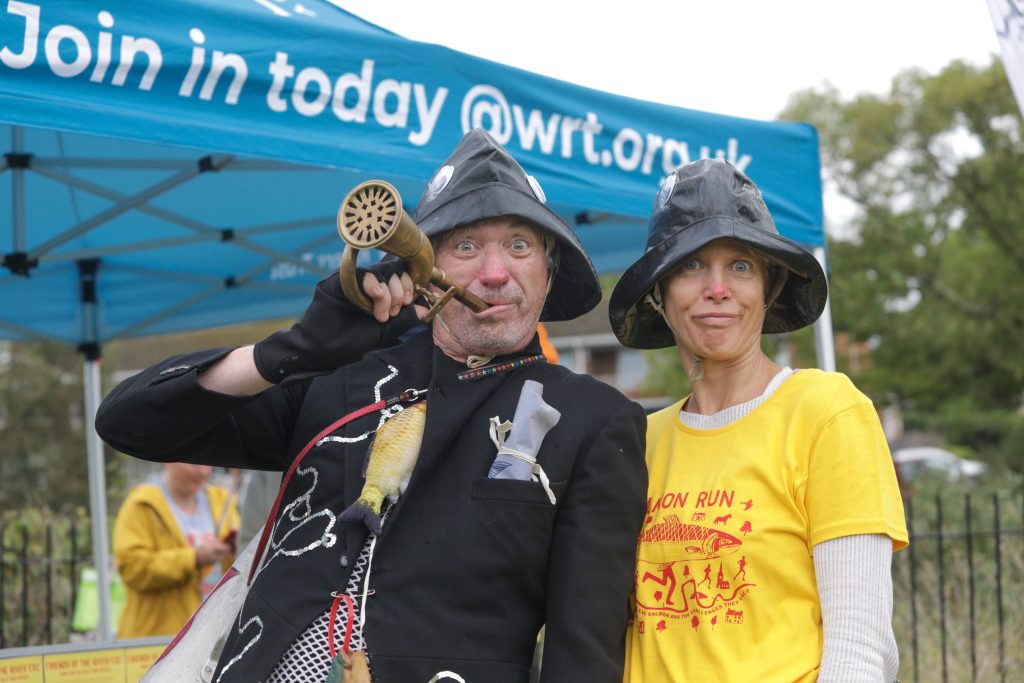
Fun and games for the Salmon Run races
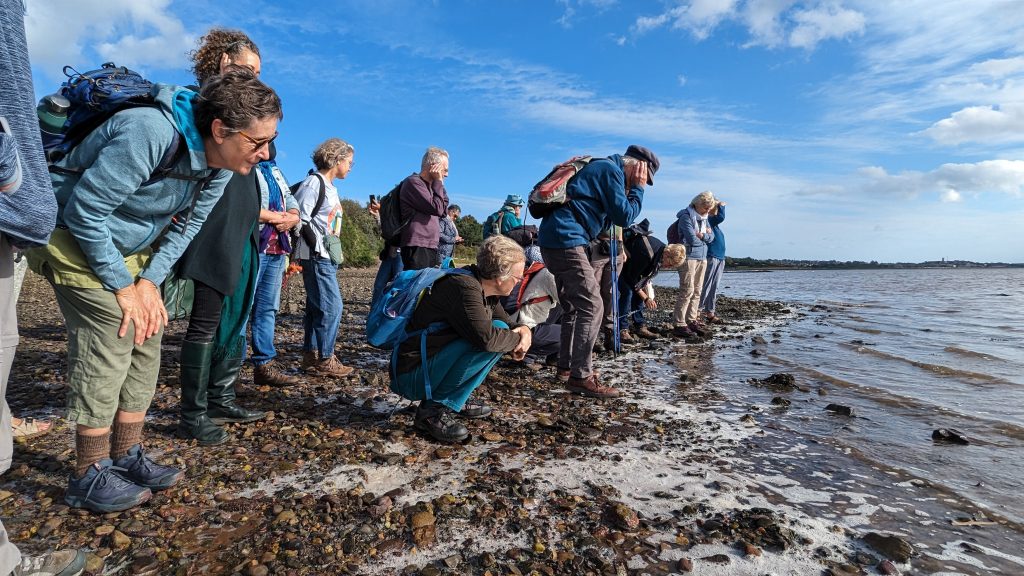
Participants in a sound walk reconnect with the river
As the work evolved and the profile grew, additional funding came in to join the Transition Together seed funding. Now they are exploring how to build on what they’ve started, investigating legal routes to protection, restoration projects and finding ongoing funding to continue the good work they’ve started.

Nightswimmers at Exmouth
I asked Nicky what advice she would have for other groups thinking about maybe putting in a Transition Together Seed Funding application. “That process of finding something that connects what your group is doing to what other groups are doing is great,” she told me, and by working together as three Transition groups, they’ve been able to partner with many more local organisations along the length of the river and create a really amazing project which everyone is talking about.
“Find the thing that you’re passionate about that can also increase understanding of Transition. It would be good if you thought through what you’re actually going to do a bit better than we did, but also don’t think about it too much, there is an element here of ‘suck it and see’, of getting going and seeing where it goes”.
Find out more about Friends of the River Exe.
Find out more about Transition Together Seed Funding, made possible by the National Lottery Community Fund. The next round of seed funding will be coming very soon.






